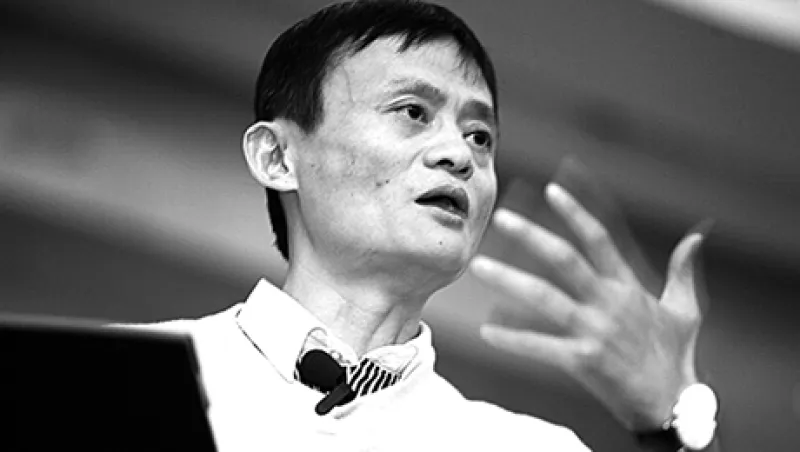Chinese e-commerce giant Alibaba Group has gone on a shopping spree — spending more than 40 billion yuan ($6.5 billion) — on more than a dozen acquisitions before its upcoming initial public offering in New York.
The Hangzhou-based company that is a combination of Amazon, eBay and PayPal in the Chinese market has added a slew of assets to its portfolio, including a dairy company, a soccer team, an online TV platform, a mobile web browser company and a 10.35 percent stake in Singapore Post, one of Asia’s leading postal and logistics companies.
Although both Alibaba and its founder and chairman, Jack Ma, are keeping quiet ahead of the IPO, their actions are drawing considerable attention and debate.
Citing the company’s quiet period before the IPO, Alibaba’s Hong Kong–based spokeswoman Florence Shih declined to comment on the rationale behind the acquisition spree. Analysts say the purchases are designed to launch the company on an aggressive expansion, both domestically and globally, after the IPO, which is expected to raise more than $20 billion.
“These acquisitions, some of them are part of finely tuned ongoing strategic plans, while others are acquisitions that allow the company to expand into other geographies and into other industries to prepare for new possibilities,” says Chris Powers, a research analyst with Shanghai-based financial research and advisory firm Z-Ben Advisors. “Some may just be part of an arsenal they are acquiring.”
Beginning about a year ago, Alibaba started to buy companies that added to its girth. Chief among them was a 1.18 billion yuan acquisition of a 51 percent stake in Tianjin-based Tianhong Asset Management Co., Alibaba’s vehicle for expanding into financial services. Tianhong manages the e-commerce company’s money market fund, Yu’e Bao, which in just 12 months has exploded to become China’s largest such fund with more than $90 billion in assets under management. The company also has ambitions to set up an online bank and has applied for a license, says Powers. “Alibaba will surely get a banking license at some time,” he says. “The fact they got regulatory approval for the Tianhong Asset Management acquisition signifies that regulators see they have a role in the financial system.”
Founded in 1999 by former English teacher and tour guide Jack Ma out of his apartment in Hangzhou, an ancient city about a two-hour drive from Shanghai, Alibaba has grown to become China’s leading e-commerce company, with sales topping $7.5 billion in 2013. The group’s Taobao platform plays host to some 7 million online merchants, who combined sold more than 1 trillion yuan worth of products to more than 500 million registered buyers last year. The cash flow generated by that commerce has fueled Yu’e Bao’s rise.
Shortly after the Tianhong acquisition, Alibaba acquired an 18 percent stake in Sina Corp.’s Weibo, China’s equivalent to Twitter, for $586 million. Weibo has more than 400 million users and potentially gives Alibaba a new sales and distribution channel for merchandise as well as financial products.
In recent months Alibaba paid $532 million for a 20.6 percent stake in Hangzhou-based Hundsun Technologies, a company that designs and builds financial trading systems for Chinese stock exchanges.
“Hundsun allows them to enter the financial technology service industry,” says Powers. “It also allows them access to a user base and to leverage that into entry into possibly someday servicing institutional clients.”
Some acquisitions have drawn more question marks than applause as they do not seem to fit with Alibaba’s e-commerce platform. For instance, on June 6, Yunfeng Capital, a private equity firm co-founded by Ma, and CITIC Private Equity Funds Management announced they would invest at least 2 billion yuan for a 60 percent stake in a unit of Inner Mongolia Yili Industrial Group, a dairy products company. The deal comes just a day after Ma announced that he was spending 1.2 billion yuan for half of Guangzhou Evergrande Football Club, China’s most prominent soccer club, coached by the veteran Italian manager Marcello Lippi.
The deals follow Ma’s announcement that he is investing $1.5 billion to acquire Chinese digital mapping firm AutoNavi Holdings and $1.1 billion to buy a 20 percent stake in online TV company Wasu Media Holding Co.
“Alibaba built its girth in e-commerce,” says Chris Harvey, the Hong Kong–based global and Asia-Pacific head of financial services at accounting and consulting firm Deloitte Touche Tohmatsu. “It recently moved into financial services, and now it is about to offer TV, movies and other content. They see content as a huge potential market that has many synergies with the other parts of their business, and it is a way of further leveraging on their huge customer base.”
Even the soccer team acquisition makes logical sense, says Harvey. “In many cases, sports teams are a bit of vanity play for a CEO, but in this case I don’t see this as a vanity play at all,” he says. “I see it as a marketing tool and to some extent a content tool. Content is important. It is about the customer. It is about getting more intimate with your customer, in terms of meeting a whole range of their needs, and not just meeting their need in one dimension.”
Ma’s spate of acquisitions, however, challenges Harvard management theorist Michael Porter, who became famous for advocating that companies stick to their core competence as a formula to success.
“There is traditional management theory, the Michael Porter type of management theory: Stick to your knitting, stick to it and do it well, and that will be better for you,” notes Harvey. “In the West you see the decline of the conglomerate type of organization. The concept is focusing on your core competence. But if, like Alibaba, your core competence is aggregating and servicing customers, that changes things a little bit. You can say my core competence is meeting the needs of my customers, and my customers have diverse needs, and if I can meet the needs of my customers, that makes sense from a core competence perspective.”
Even if Alibaba over time determines that some of the acquisitions don’t make strategic sense, it can always sell them, says Harvey. “You can have an acquisition strategy of buy to improve and buy to sell. There are all kinds of reasons to buy, not just to buy to hold.”
Get more on corporations.






